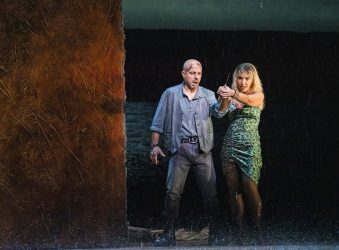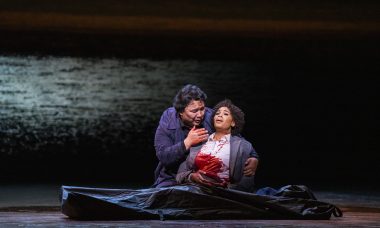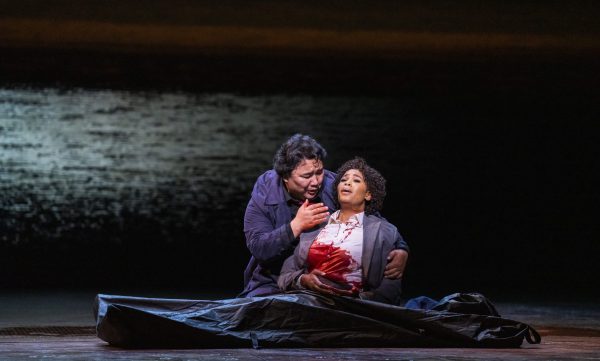 United Kingdom Verdi, Rigoletto: Soloists, Chorus and Orchestra of the Royal Opera House, Covent Garden / Julia Jones (conductor). Royal Opera House, Covent Garden, 24.10.2023. (CC)
United Kingdom Verdi, Rigoletto: Soloists, Chorus and Orchestra of the Royal Opera House, Covent Garden / Julia Jones (conductor). Royal Opera House, Covent Garden, 24.10.2023. (CC)

Production:
Director – Oliver Mears
Revival Director – Danielle Urbas
Set designer – Simon Lima Holdsworth
Costume designer – Ilona Karas
Lighting designer – Fabiana Piccioli
Movement director – Anna Morrissey
Cast:
Duke of Mantua – Stefan Pop
Rigoletto – Amartuvshin Enkhbat
Gilda – Pretty Yende
Sparafucile – Gianluca Buratto
Maddalena – Ramona Zaharia
Giovanna – Veena Akama-Makia
Count Monterone – Fabrizio Beggi
Marullo – Grisha Martirosyan
Matteo Borsa – Michael Gibson
Count Ceprano – Jamie Woollard
Countess Ceprano – Amanda Baldwin
Page – Louise Armit
Court Usher – Nigel Cliffe
This is my third bite at Oliver Mears’s Rigoletto apple: the first run was in September 2021, conducted by Antonio Pappano, with Liparit Avetisyan as the Duke, Carlos Álvarez as Rigoletto and Lisette Oropesa as Gilda (review here); the second had Francesco Denuro as the Duke, Luca Salsi as Rigoletto and Rosa Feola as Gilda under Stefano Montenaro.
Casting any Verdi opera is a director’s nightmare. Perhaps that first run had the most consistently casting, although the second had its strengths. This time, the cast was notable mainly because the Rigoletto dominated the entire performance: Mongolian baritone Amartuvshin Enkhbat. This was a towering interpretation at every moment, on every level. Vocally he was on top form, but it was the acting which created what felt like the ultimate portrayal. Rigoletto the character might not be the most attractive operatic persona, but here one felt at least some understanding of his frustrations and fears, and how they manifest in his behaviour. His ‘Cortigiani vil razza dannata’ was a tour-de-force, strong, potent even. It is rare that an assumption of a role moves beyond criticism, but that Enkhbat basically achieved that on this occasion.

While I thoroughly enjoyed Pretty Yende’s Violetta in La traviata in April 2022 (review here), her Gilda was much more of a mixed bag. She has the high notes and vocal mobility, but this felt disengaged, continually just missing her best form. It is a rare event that the Gilda is overshadowed by the Giovanna, a servant, but here it was Veena Akama-Makia who seemed the stronger singer, the most engaged with the drama and her role.
As to the Duke, this was taken by the well-respected Stefan Pop with a real sense of swagger, his ‘Ella mi fu rapita’ a real highpoint of the evening. Another pity, then, that his ‘La donna è mobile’ was rather stand-and-deliver. Fabrizio Beggi was impressive as Monterone – this is the first time I have encountered him, and his large voice suited the role perfectly.
It was Ramona Zaharia who took the role of Maddalena and put her all into the third act. This role is shared with Elena Maximova, whose recent Carmen at Strasbourg was something of a mixed bag. It would be interesting to see what Maximova does with Maddalena, but in the present ensemble, Zaharia was one of the stronger members, absolutely convincing in the pimped-out role.
All the smaller roles were taken by strong singers, while the chorus remains exceptional. Mears’s production does reveal depths on repeated viewings, though, with the massive reproductions of classic paintings both relevant, and a reflection of the duke’s penchant for excess. The stormy atmosphere of the final act is superbly conjured visually, too.
One of the most memorable aspects of the first run of this production was Pappano’s conducting, impeccably aligned with Verdi’s score. Julia Jones was far less impressive, operating on a more surface level and occasionally rather workaday. The run is shared by Covent Garden’s ex-chorus master Renato Balsadonna. Now that should be interesting — and the chorus will surely be on its toes!
Colin Clarke
